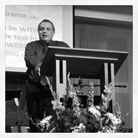“A Piece of My Mind”
October 2014 Newsletter from Donald Shoemaker
Advancing Christian Faith and Values, Defending Religious Liberty for All, Supporting Civility and the Common Good through Preaching, Teaching, Writing, Activism and Reasoned Conversations
“Beatitudes for Educators”
What we call “The Beatitudes” (the statements of blessedness found in Matthew 5:1-12) are among the most cherished words of the Bible.
Jesus spoke these words at the beginning of what we call “The Sermon on the Mount” (chapters 5-7 of the Gospel of Matthew). Jesus said, “Blessed (favored) are the poor in spirit…those who mourn…the meek…those who hunger and thirst for righteousness…the merciful…the pure in heart…the peacemakers…the persecuted.”
I have the deepest respect for quality educators and others who work with dedication in educational systems. Here I’ve taken The Beatitudes and made application to these honorable people.
“Blessed are the poor in spirit.”
So, blessed are you…when your frustration level is so high and your human resources so low that you realize you must turn to God for renewed strength.
“Blessed are those who mourn.”
So, blessed are you…when your heart is broken over how cruel people can be to other people and over how little children can become innocent victims of violence, even to the shedding of blood. Blessed are you when you grieve over the children who come to school with the deck already stacked against them because their house is not a home and they have no real role models or incentives for being good.
“Blessed are the gentle.”
So, blessed are you…when you turn the other cheek, walk the second mile and continue to work with patience in a situation, even when it seems just about impossible.
“Blessed are those who hunger and thirst for righteousness.”
So, blessed are you…when your frustration over the lack of learned values, moral standards and discipline make you want to chuck it all, but you stay committed to your education task as a calling from God and you don’t forget the importance of your own moral nourishment.
“Blessed are the merciful.”
So, blessed are you…when you reach out your hand to a child desperately needing love and care and concern and assistance, who may not find it from anyone other than you.
“Blessed are the pure in heart.”
So, blessed are you…when you maintain your moral standards in the face of temptations to cut ethical corners and when others see you take your stand on principle, no matter the cost to you.
“Blessed are the peacemakers.”
So, blessed are you…when you intervene in the cause of peace, even at personal risk, and help children who don’t like each other to learn at least how to live civilly with each other and to practice the “Golden Rule.”
“Blessed are those who are persecuted for the sake of righteousness.”
So, blessed are you…if you are ever belittled or have to put your reputation or career on the line and pay a price for following the best values.
In all this God is well pleased with all you do and, in the end, that’s what really counts.
© 2007 Donald P. Shoemaker
Note: These “Beatitudes for Educators” were published as a Guest Column in the Long Beach Press-Telegram, October 2, 2007). After this column appeared I received this:
Dear Rev. Shoemaker:
Today I read your blessing… It was a beautiful way to start my day. I taught school for 30 years before changing careers, and I would have kept this in my desk and made a copy for the refrigerator to look at every time I felt stressed.
I imagine that any educator who read this before going to school took it with him or her to start the day. The column undoubtedly graces many a teacher’s lounge bulletin board…
Don’s Upcoming Ministries

October 5 – Speak at Sunday Morning Worship Services at Grace Community Church of Seal Beach (8:00, 9:30 & 11:00).
Message: “Faith That’s Worthless & Faith That Works” (James 2:14-26)
October 13-15 – Attend advanced chaplain training in Sacramento at the regional meeting of the International Conference of Police Chaplains
What Do We Want?
A Free Society? Or a “Correct” Society?

“Congress shall make no law respecting an establishment of religion, or prohibiting the free exercise thereof, or abridging the freedom of speech, or of the press; or the right of the people peaceably to assemble, and to petition the Government for a redress of grievances.”
– 1st Amendment
The First Amendment to the U.S. Constitution—
What a pesky nuisance it can be!
Whenever the Secular Left or the Religious Right want to come along and impose a secular or religious agenda in America that abridges the rights of others, the First Amendment rises and nips them. When Political Correctness tries to limit freedom of expression and academic freedom, the First Amendment speaks up and says, “No, you can’t!” When the government tries to impede political speech or force its social agenda on religious people who in good conscience disagree, the First Amendment steps forth and blocks it.
At least that’s how it should happen. But since “Eternal Vigilance is the Price of Freedom”, we can never be passive about defending the ideals of freedom expressed in this liberty statement. It is a concept truly foreign to history, foreign to most societies today, and foreign to the desires of many people and pressure groups here in America.
Here are three examples imposing “correctness” over freedom:
- California State University—Long Beach
This campus denied official recognition to InterVarsity Christian Fellowship because the group required its leaders to confess basic Christian principles. It is a classic example of elevating correctness over freedom.
An editorial in the Long Beach Press-Telegram gave a well-stated defense of CSULB: “While there is room for exploration and debate about religion at public universities, there is no place for state-funded discrimination based on beliefs.” This editorial continued by saying that a willingness to accept people of all faiths would make the group acceptable. Meaning: particularism in religion is forbidden; universalism is supportable.
I fully appreciate what the institution wishes to accomplish. But why wouldn’t a religious exemption further what CSULB is trying to do?
In 2012 the U.S. Supreme Court unanimously rendered a major decision recognizing that religious groups have the right to demand religion-based standards for their ministers (leaders—understood more broadly than “clergy”). Chief Justice John Roberts wrote, “The Establishment Clause [of the First Amendment] prevents the government from appointing ministers, and the Free Exercise Clause prevents it from interfering with the freedom of religious groups to select their own.”
The court has seen for many years that the right of religious groups to choose leaders by their own standards enhances religious liberty rather than hindering it. The practice is fully in accord with the First Amendment.
Again, while understanding what CSULB wishes to achieve, we must also understand that it holds “correctness” over “liberty.” And to think, this is the same campus that once posted (I read it) an opening for a faculty position in the women’s studies program, requiring that applicants have a record of service in feminist activities! So much for academic freedom of viewpoint! *
- Harvard University
An editorial in Crimson, the daily student newspaper at Harvard, advocates “justice” over “academic freedom”:
If our university community opposes racism, sexism, and heterosexism, why should we put up with research that counters our goals simply in the name of “academic freedom”?
Instead, I [Crimson editorial writer Sandra Y. L. Korn] would like to propose a more rigorous standard: one of “academic justice.” When an academic community observes research promoting or justifying oppression, it should ensure that this research does not continue.
Now, “justice” is not a clearly objective thing, like the date of the next full moon. People bring their biases into definitions of “justice.” Sometimes there is societal consensus on justice, often not. Once again, this argumentation prefers “correctness” over “freedom”. Instead of following the evidence wherever it leads, the “justice” criterion requires outcome-based research, which has the effect of putting “research” inside quotation marks.
[Note: The First Amendment applies to the actions of government entities, not private entities like Harvard or individuals. Nonetheless, it plays a key tutorial role in society and its enumerated freedoms certainly permeate educational institutions.]
- Morgan Hill (CA) Unified School District
In February of this year a three-judge panel of the 9th District Court of Appeals ruled the school was within its rights to ban students from wearing shirts that displayed the American flag on Cinco de Mayo. On September 17 the court declined to rehear the case before all the justices. Some words from the three dissenting judges:
The freedom of speech guaranteed by our Constitution is in greatest peril when the government may suppress speech simply because it is unpopular. For that reason, it is a foundational tenet of First Amendment law that the government cannot silence a speaker because of how an audience might react to the speech. It is this bedrock principle — known as the heckler’s veto doctrine — that the panel overlooks, condoning the suppression of free speech by some students because other students might have reacted violently…
In this case, the disfavored speech was the display of an American flag. But let no one be fooled…the panel opens the door to the suppression of any viewpoint opposed by a vocal and violent band of students… [example given: a shirt announcing “Christ is risen!”] It might be any viewpoint imaginable, but whatever it is, it will be vulnerable to the rule of the mob.
* If anyone can clarify the convoluted, agenda-driven description of academic freedom in the current Mission statement of the Department of Women’s, Gender & Sexuality Studies at California State University Long Beach, I’d sure like to hear it.
Bible Insight: Let the Bible Say What It Says!
(Don’t impose your own meaning on it.)
How you have fallen from heaven,
morning star [Lucifer] , son of the dawn!
You have been cast down to the earth,
you who once laid low the nations!
You said in your heart, “I will ascend to the heavens;
I will raise my throne
above the stars of God;
I will sit enthroned on the mount of assembly,
on the utmost heights of Mount Zaphon [of the north].
I will ascend above the tops of the clouds;
I will make myself like the Most High.”
– Isaiah 14:12-14 (New International Version)
From early childhood I was taught that these verses referred to Satan, the Devil—how he was once a majestic angel named Lucifer. But he fell from his high estate due to pride and rebellion. If you were preparing a lesson on the Devil, point #1 would be “Satan—Origin and Fall (Isaiah 14:12-14).”
Many years later, while reading the Bible through in a year (a discipline I highly recommend!) I read through the Book of Isaiah, the prophet of Israel. I came to Isaiah 12:1 through 14:23, which explicitly introduced itself as “an oracle concerning Babylon.” I read chapter 14:3-23, which explicitly begins with “take up this taunt against the king of Babylon“. In these contexts I read Isaiah 14:12-14.
Did I find any reference at all to Satan (the Devil) as, for example, you would find if you read the Book of Job 1:6-12? No, not at all. Not in the slightest.
But wait! Isn’t the Bible to be taken “literally”? If so, how can any earthly king “fall from heaven”? So, the argument goes, these verses look beyond the earthly king to the Devil, the sinister spirit that inspired this evil king. In other words, the Bible may have a “Meaning” within the “meaning”!
But, like an archangel clipped of his wings, that won’t “fly”!
First of all, the context literally says it speaks about Babylon and her king. To make verses in this context say otherwise would be an example of importing and imposing a foreign meaning onto the text.
Second, “literal” doesn’t mean ruthless literalism. The “literal” meaning of any particular scripture is the meaning intended by the writer, including the meaning drawn from the type of literature it is. And the Bible has many kinds of literature: poetry, narrative, taunts, diatribe, epistle, parable, apocalyptic imagery and more. All these must be understood in light of their own nature.
Remember the word “taunt” (Isaiah 14:4)? What is a taunt? Go to a baseball game and listen! Taunts are forms of mockery. “Blind batter” comes to mind (many sports taunts are unprintable). In the Bible, taunts go far beyond literalistic meaning to score their points. This taunt is a song directly addressed against an aspiring world conqueror—now a fallen and disgraced tyrant. It serves as a negative example to discourage other rulers from following the same power-hungry path. *
To bring my lesson home, let me give these thoughts to guide us…
- Yes, the Bible is “inspired by God.” To my understanding, this means that God superintended the process of composition so that what was written was what God wanted written. We rightly call the Bible “The Word of God.”
- Point #1 must be balanced with also seeing the Bible as “the word of man.” It rose from human contexts and all that entails (language, culture, location, issues, and more). The writers were “authors” in the true sense of the word, not just “stenographers” taking down heavenly speech (as if the Bible was dictated). As authors, their own personalities, knowledge, talents and perspectives shown through (all superintended by God). Christians who strongly believe the Bible is “God’s Word” may tend to overlook or minimize the humanity of Scripture **, thus skewing its meaning.
- Verses of the Bible must always be understood in context.
- “Context” includes many things, not just literary location – type of literature (see examples above) being one main contextual factor.
- Don’t “proof-text” the Bible. Reading it through, or at least reading large sections of scripture, will help keep you from “proof-texting.” This means you will need to be cautious with favorite practices like “verse for the day” or “promise to claim” or “what this verse is saying to me.” Remember: a verse of scripture doesn’t mean what it never meant.
- The Bible’s meaning is not to be sought through private interpretation by isolated Christians. Its meaning should be sought within the community of believers.
- Draw applications from verses and chapters in the Bible once you see their meanings in their contexts. The oracle against Babylon and the taunt against her king warn all people about God’s judgment against ruthless power and pride. Judgment will come against such nations and against rulers who think themselves important enough to pull up a chair and sit down beside the Most High God.
There are many excellent books on interpreting the Bible. I recommend: Gordon D. Fee and Douglas Stuart, How to Read the Bible for All Its Worth: Fourth Edition (Zondervan).
* For an understanding of “taunt” as a literary device: James D. W. Watts, Isaiah 1-33: Word Biblical Commentary, vol. 24, pages 207-12, and “Masal”, Dictionary of Old Testament Theology & Exegesis, vol. 2, pages 1134-36.
** Christians who exalt the divinity of Scripture at the expense of its humanity also often exalt the divinity of Jesus to the detriment of his humanity. Thus, they have an impervious Jesus who walked an inch off the ground and is rather untouched by our weaknesses, since (as God) he didn’t truly-truly experience them himself.
When I commented once that the beatings imposed on Jesus in the excellent movie “The Passion of the Christ” would have so weakened him that he would be unable to carry the cross, someone replied, “But don’t forget who this man was!” That’s what I mean.
© 2014 Donald P. Shoemaker



